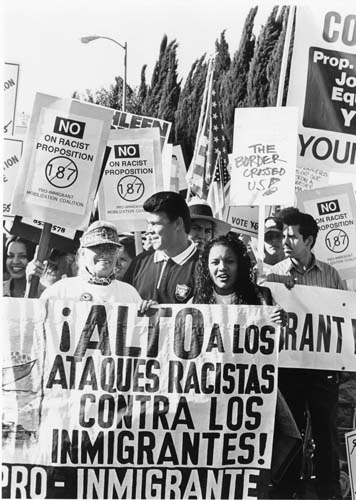
Proposition 187 won the vote in 1994. But the reaction to it was a victory for Latinos and progressives in California.
(Courtesy La Opinión)
For all its eventual enormity and political bloodshed, Irene Sanchez says for her Prop. 187 started as a middle school rumor.
"The whispering going on in the classroom was, 'They hate us.' And by 'us' they meant Mexicans," she tells me one recent Monday evening.
We're sitting in a coffee shop on Cesar Chavez in the heart of Boyle Heights. There's Dia de Muertos stuff all around us and an American pop song is playing on the overhead speakers.
"I didn't understand exactly why people didn't like us, or people like my parents or my grandparents," Sanchez recalls.
There's a glimmer in her eyes as she relives this pivotal moment from 25 years ago, when she was just 11 years old. That's because if her first memory of Prop. 187 is fear, the second is strength. "I don't think I would have ended up doing what I'm doing now, teaching, had it not been for that moment," she explains.
A version of this conversation -- with most people (me, listening) holding back tears -- played out all over Los Angeles this past month as I made my way through a Southeast L.A. swap meet, college and high school classrooms on the Westside, a San Fernando taqueria, and a Pasadena restaurant nested inside a liquor store. I was there to talk to people who, in large part, credit their success today to losing battles they fought to stop Prop. 187 in the fall of 1994.
The year before, a group of conservative Orange County political activists drafted what they called the "Save Our State" initiative, better known as Proposition 187. Their goal was to keep immigrants who could not prove their legal status from using public services like health care and education. The prohibition included children. Supporters said the idea was to save the state money.
Even before this ballot initiative gained steam, then-Gov. Pete Wilson had been hitting illegal immigration as he campaigned for re-election. An infamous campaign ad from Wilson depicted what appeared to be an unchecked Mexican invasion at the border. It featured grainy, black and white footage of people running through traffic at a border crossing while a menacing disembodied voice said, "They keep coming."
At the end of the ad, Wilson plugged how he was "working to deny state benefits to illegal immigrants."
When I was talking to Irene Sanchez, she tells me: "That commercial, I never erase it from my memory." Neither do I.
THE CHILDREN
Even now, I can feel the shaggy carpet of my childhood home clutched in my fingers as I sit on my knees, captivated by this scary ad, playing every commercial break on our one color TV.
It was the first time I had to ask my parents if they had green cards, if I had a green card, if we were American. They did. I was born here. And, "Damn, right, we're American!" I can still hear my father screaming in heavily-accented Spanglish. "Don't start con esas tonterias."
I heard my dad say it again recently when I asked him and my mom, now U.S. citizens who only vote for Democrats, if they remembered Pete Wilson.
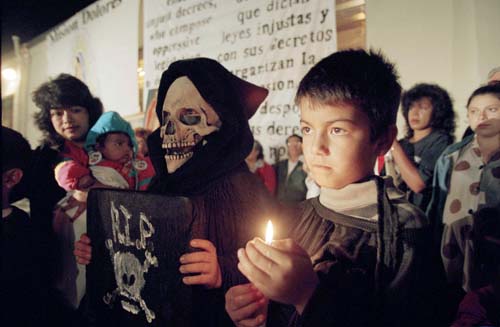
Adan Anguiano, 9, right, holds a candle next to a masked Jeffrey Arroyo, 9, in costume as Death, during a vigil in protest of Proposition 187 attended by 100 people at Dolores Mission Catholic Church in Los Angeles, Nov. 1, 1994. (Eric Draper/Associated Press)
My mother clutched her chest and sighed, "Ay, los niños," like I had just invoked La Llorona, the mythical woman who drowned her children and wanders the earth terrifyingly crying for them.
And I still remember walking out of class when Prop. 187 passed -- with nearly 59% of California voters approving it -- and marching through the green gates of my middle school in Downey, all alone -- until the school principal caught up to me and sent me to detention.
Most of Sanchez's middle school in Riverside participated in the walkouts.
ADVERTISEMENT
"I remember when we walked out, we were going to join the high school students who were marching in the streets," she says. "But in our middle school, there were these big gates surrounding the school."
She remembers a school official pulling the gates shut.
"Some of the students made it out in time, but most of us didn't. And so the school basically locked us in," she says. "And we were watching through the gates and we could see the high school students marching by us."
But the school officials couldn't stop what was happening in the students' minds.
"Because of what happened around Prop. 187, my high school ended up having the first ever Chicano Studies class in 1996, when I was a freshman," Sanchez says with a smile. "And so I was in that first class."
Today, Sanchez has a doctorate in education and teaches Chicano Studies to high school students in the San Gabriel Valley.
Memo Torres was in 8th grade in 1994 when he walked out with the rest of his middle school. Torres is a popular social media influencer and now contributor at L.A. Taco (my old haunting grounds). Over a lunch of tacos de chivo inside a liquor store in North Pasadena, we talk about how Prop. 187 was a political awakening for his whole family.
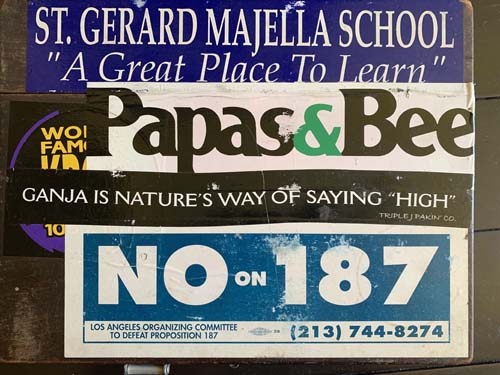
Memo Torres was in middle school when he walked out to protest Prop 187. He still has his "No on Prop. 187" sign from that protest. (Courtesy Memo Torres)
"We used to talk about novelas and Sábado Gigante, now we were talking about Pete Wilson and Prop. 187," Torres explains. "I didn't know what a protest was before then."
THE ACTIVISTS
The walkouts happened thanks in large part to a group of young Latino activists who were inspired by Cesar Chavez, the Civil Rights Movement, and the Brown Berets of the 1968 East L.A. Blowouts. They also helped organize one of the largest rallies Los Angeles had seen since the days of the Vietnam War. About 70,000 people marched on downtown L.A. on Oct. 16, 1994 Prop. 187 protest.
One of them was Angel Cervantes, who today teaches U.S. history to high school and college students in the San Fernando Valley and lives a stone's throw away from a taqueria that probably serves the hottest salsa verde in Los Angeles.
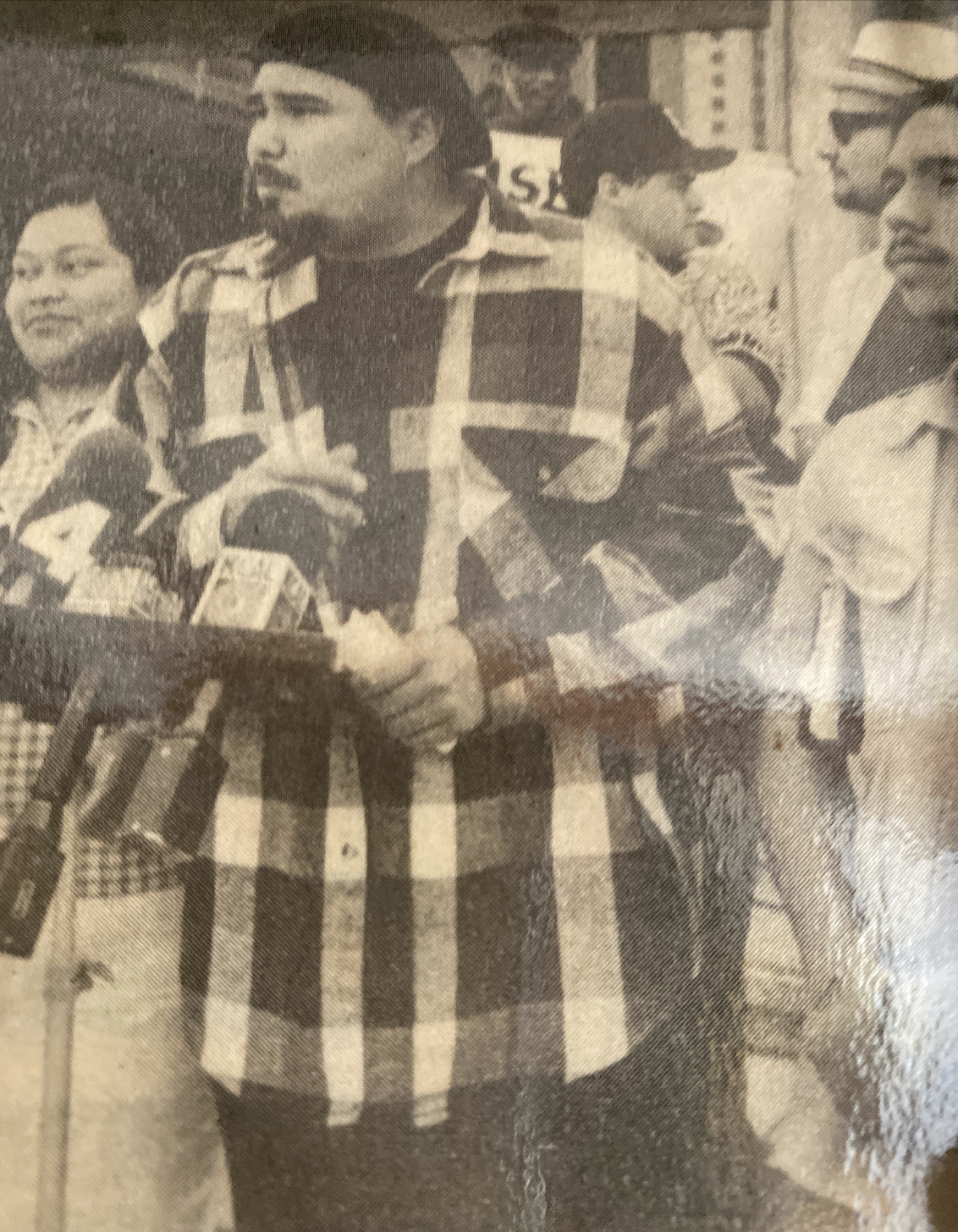
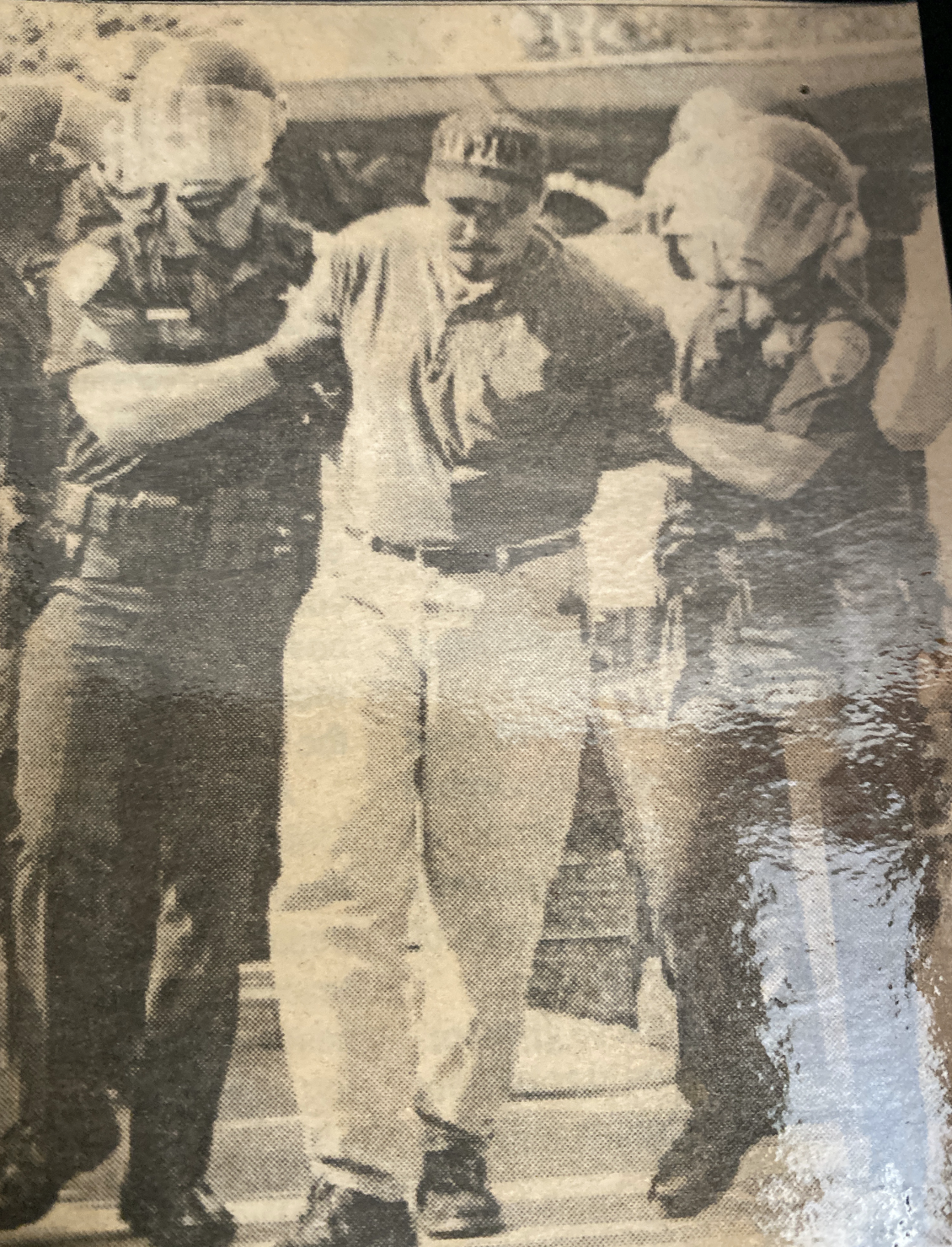
Angel Cervantes was one of the student leaders of the anti-Prop.. 187 movement. Cervantes's group was called the Cuatro Vientos or Four Winds. They all wore berets like this one. (Courtesy Angel Cevantes); Cervantes was arrested during one of the teach-ins, an act of civil disobedience meant to bring attention to the issue. (Courtesy Angel Cevantes)
"It was the biggest thing I had ever seen," Cervantes says of the rally. "Probably one of the most life changing empowering moments to see so many groups, so many organizations, so many banners, so many different Latin Americans, you know. It was very powerful."
In the fall of 1994, Cervantes was working on his master's thesis at Occidental College. By day, he studied the history of the Chicano activist groups. By night, he led a group called the Cuatro Vientos.
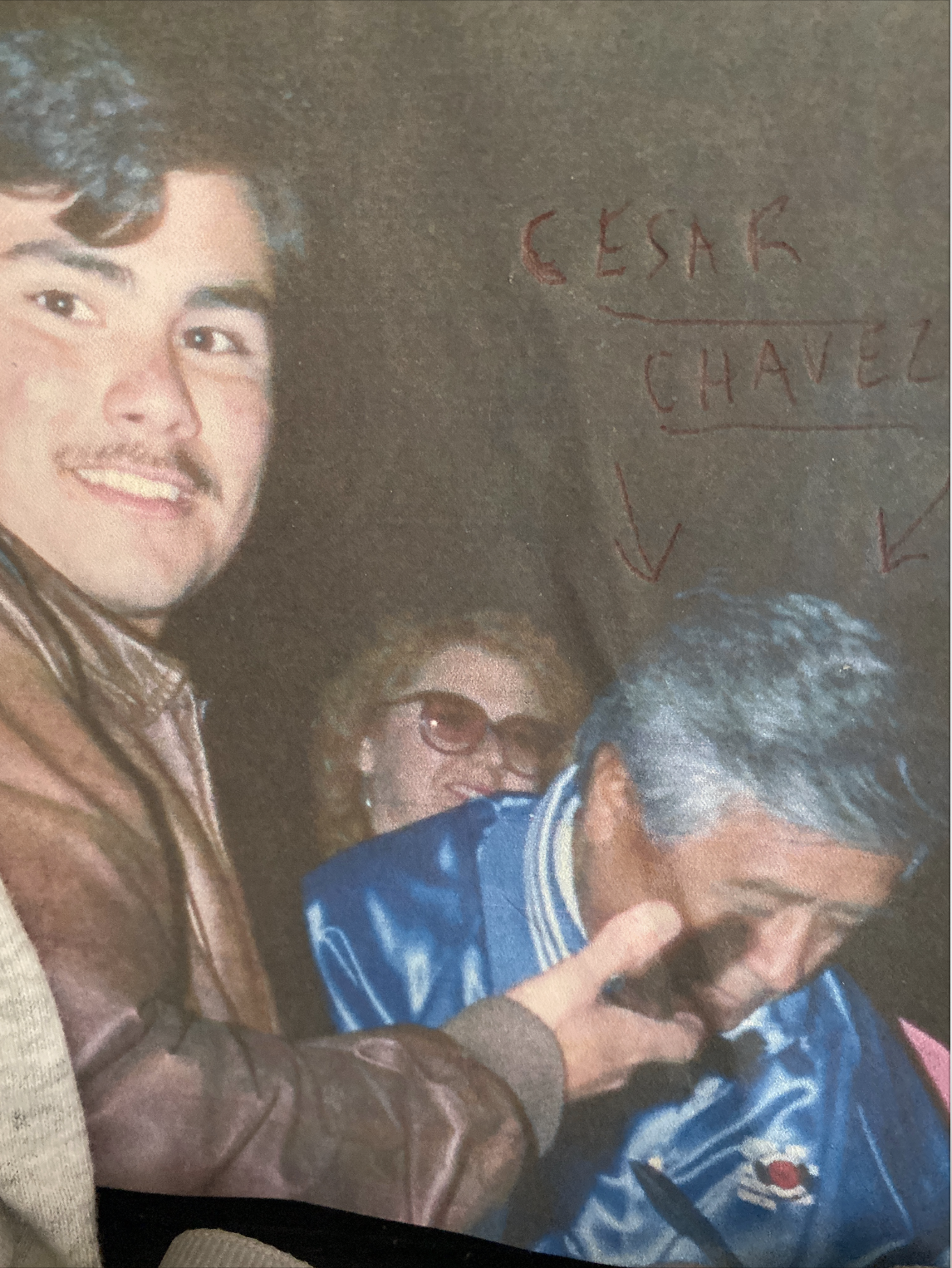
Angel Cervantes was one of the student leaders of the anti-Prop. 187 movement. Cervantes is photographed here with his hero, Cesar Chavez. (Erick Galindo/LAist)
"We called it the four winds, los Cuatro Vientos, because we wanted to organize all students, all colors, all people," says Cervantes. "We were a group of initially college students who want to get involved and begin to organize mass demonstrations, walkouts, teach-ins."
I talk with Cervantes in his kitchen, the war room of most Latino households. He's dressed for protest: a T-shirt with President Donald Trump's face crossed out, even his old black beret from his activist days. I ask him why Prop. 187, which he initially saw as an attack on him and his family, now seemed to hold a warm place in his heart.
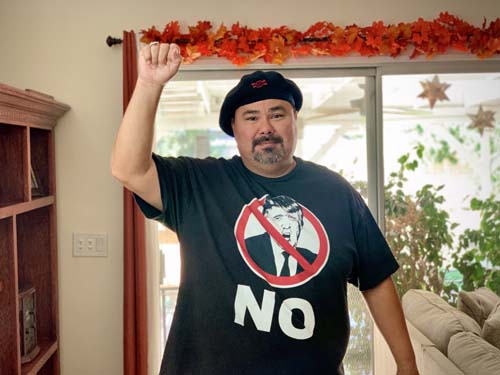
Angel Cervantes was one of the student leaders of the anti-Prop. 187 movement. (Erick Galindo/LAist)
"Very few of those kids were over 18, who were organizing, but they changed the world," Cervantes says. "They changed the political dynamic."
At the time, the Democratic leadership was opposed to the protests, says former California Assembly Speaker Fabian Nuñez.
Nuñez was just 28 at the time, working as a manager for nonprofit One Stop Immigration and leading the Prop. 187 resistance.
"It was a lonely path that we charted, because it was a path of most resistance," Nuñez says. "And the Democratic political establishment wasn't with us. They were trying to convince us to not continue down the path of activism."
In the end, in spite of massive protests which made national news, Prop. 187 won by a wide margin. It felt like a major loss to the Latino community and others who'd opposed it. But as Nuñez sees it today, it was a necessary loss if things were to change for the state's historically marginalized groups.
ADVERTISEMENT
"From all perspectives, you know, when 187 passes, Pete Wilson gets reelected, and the Republicans continue strong majorities, both in the Senate and the State Assembly," Nuñez admits. "All of those things were scary, but as lonely as it may have been, we knew that we needed to chart a course that said to immigrants, 'You belong. You have the right to be here. And that belonging is an expression of your collective dignity.'
"I think it made a big difference. I really do."
THE FIGHTERS
The day after Prop. 187 passed, opponents filed suit. The measure was blocked by a federal judge shortly afterward. Three years later, a federal judge ruled it unconstitutional. Its controversial provisions were never implemented.
I talk with California Community Foundation President Antonia Hernandez, at the time a lawyer for the Mexican American Legal Defense and Educational Fund (MALDEF). She was among those who went to federal court the very next day after the election to fight the legal battle.
Hernandez is small in stature, and she has the kind of warmth in her eyes that reminds you of your favorite aunt. But tia's eyes kick up flames when you bring up the Prop. 187 battles, and you get the sense of her enormity in the legal world.
"All of those young men and women were activated and mobilized and decided to go into public service so that our voices could be heard," she tells me, when I ask her if it was the legal battle or the activism that won out against Prop. 187. "It was the litigation and the community organizing together that made what California is today."
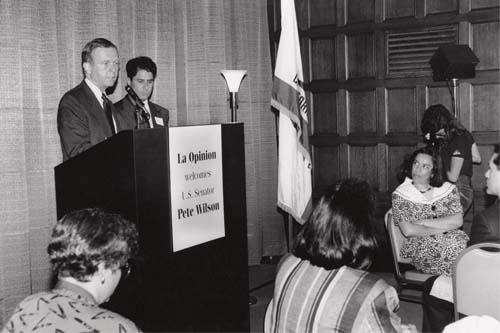
Antonia Hernandez, right, at the time president and general counsel of the Mexican American Legal Defense and Educational Fund (MALDEF), looks on as future Gov. Pete Wilson addresses staff of La Opinión in September 1990. (Courtesy of George Rodriguez)
We talk one recent night inside a giant auditorium at Loyola Marymount University, where she's speaking. There are hundreds of people walking around noisily, but nothing distracts me from this Mexican Ruth Bader Ginsburg.
"Actually, 187 scared the bejesus out of the Latino community," Hernandez says. "It made us realize that we needed to become active and to mobilize in order for our voice to be heard. So yes, thank you, Gov. Pete Wilson for scaring the bejeebers out of our community."
I ask her about a well-known photo by noted photographer George Rodriguez. In the 1990 photo, soon-to-be Gov. Pete Wilson was speaking to a group at the invitation of La Opinión. The photo captures Hernandez shooting some laser beams out of her eyes at the future governor from her table near the podium.
"They made the mistake of sitting me right in front, and the photo only captures my sentiment," she explains.
"It didn't capture the fact that I asked him some really tough questions."
'THE SLEEPING GIANT'
Arguably the biggest impact of Prop. 187 is that it led to California becoming a solidly blue state.
The Golden State had seen many years of Republican control and a steady decline in the naturalization of immigrants. Without becoming U.S. citizens -- basically as life-long green card holders -- immigrants could not vote. According to a study of the era by the Public Policy Institute of California, naturalization rates fell from 63% to 38% between 1965 and 1993.
"This was the proposition that woke up the giant," says Angela Fajardo,who grew up in East L.A. and is now a LAUSD teacher.
"It was personal. This was an attack on us brown people."
Fajardo was an instructional aide at an elementary school and a college student at Loyola Marymount in the fall of 1994 when she first started reading through the text of Prop. 187. She was worried about what would happen if one of her students got hurt. "The biggest concern I had was if anyone looked foreign, they wouldn't have any medical services," she says. "Immediately, I was like, 'This is racist.'"
Fajardo, who was born in Nicaragua, had only a green card in 1994. She wasn't eligible to vote. But that didn't stop her from lobbying her classmates to vote against the issue. More importantly, Prop. 187 made Fajardo's Nicaraguan dad finally realize it was time to trade in his green card for a U.S. passport.
"My father, who had been here since 1981, became a citizen," she says. "Not only that, he had a book with questions that you needed to learn to pass the citizenship test. And he was out there in the community giving classes [with the book] to people."
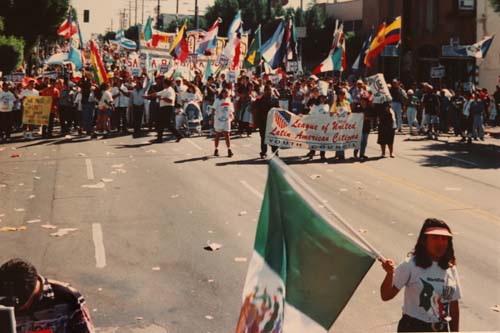
(Photo by Mario Fernando Vasquez. Courtesy Christina Vasquez.)
Fajardo says she was "very heartbroken" she couldn't vote herself, but reiterated this old Chicano saying from at least as far back as the Civil Rights Era about the "sleeping giant." After she finishes a quick after-school meal of broccoli and some mac n cheese, I ask her what that saying meant for her. She says: "187 was a turning point for the Latino community to wake up and become more involved."
Francisco Moreno was another one who couldn't vote back then. He was working as a janitor in 1994 when, as he told me, Prop. 187 woke him up.
"Something happened with me, like a light in my brain went up," he says.
Moreno began wondering what he and fellow immigrants could do to fight back, and then they did it.
"We started doing meetings to, you know, to start like an agenda to unite the Latino community," he says.
Moreno is now executive director of COFEM (Consejo de Confederaciones Mexicanas), an L.A.-based non-profit that helps immigrants know their rights and integrate, including helping them become citizens.
"[It] woke up a sleeping giant," Moreno said. "We aren't sleeping anymore."
Beyond activism or getting out the vote, there was a shift in mentality among California's Latinos after Prop. 187, says Manuel Pastor, a sociologist and director of the Center for the Study of Immigrant Integration at the University of Southern California.
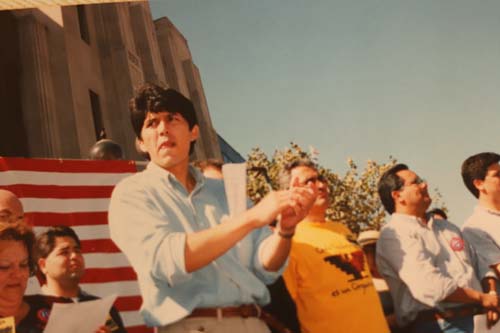
Former California State Senate Leader Kevin De León, left, was in his early 20s when he helped lead a massive rally in downtown Los Angeles to protest Prop. 187 in October 1994. (Photo by Mario Fernando Vasquez. Courtesy Christina Vasquez.)
"That, along with widening income inequality and a broader base of people of color, progressives, and labor unions, helped to provide wind to the sails of a progressive shift in the state," Pastor explains.
'THE CHECKBOX MARKED OTHER'
Miya Iwataki almost makes me cry.
Iwataki is a third-generation Japanese American who saw Prop. 187 as a potential return to the days of the WWII era anti-immigrant sentiments that led to Japanese internment camps.
"We experienced among the most anti-Japanese, anti-immigrant fervor when we were put into the concentration camps where, you know, we lost everything," she says. "So I think for Asian Pacific Islanders, as a racially and ethnically visible people of color, [187] was this whole racial profiling all over again. And that regardless of our citizenship status, the way we looked, spoke or dressed would for other people identify what our status was."
Iwataki says that Asian Americans historically have been "kind of invisible" as a community. "We were always the checkbox marked other," she says. "So it's been a long struggle even to get institutional structures of this country to recognize we are people worthy of being."
She saw Prop. 187 as a threat to those hard-earned victories. So Iwataki and other leaders of her community started organizing their own small rallies and voter drives "during the Moon Festival activities in Chinatown, and the big Korean parade in October," and eventually, the big October march in downtown L.A.
"It was a really good experience," she tells me. "It was something that was building, as more and more of us [began] to recognize that as people of color, we have so many commonalities in our history. But I have to say that during the Prop. 187 struggle, I think the bonds between the Latino and the Asian Pacific Islander Islander community got really strong."
THEN AND NOW
My first-ever job was at the Paramount Swap Meet, a bustling 73-year-old Mexican-style flea market in Southeast L.A. County that's open every day of the year. I was too young to be working, really, but I made 10 bucks a day. I only worked weekends taking food orders for the people working at the stands. During the 187 debate, I remember the swap meet being kind of dead for the first time.
People were scared, my mom explains to me recently. But my parents don't ever remember being worried about sending me there because, in mom's words, "Te ves guero." I look white, she tells me. It's a fact of my life that was sometimes literally beat into me since as long as I remember stepping into the streets of Southeast L.A., where I grew up.
For the 25th anniversary of Prop. 187's passage, I return to Paramount Swap Meet to find it's thriving. On Tuesdays, they have specials that bring so many customers, it fills several large parking lots on Paramount Boulevard. On the weekends, they have bandas, live Mexican bands that play on large stages and pack the place out like a food festival. It basically is.
ADVERTISEMENT
But if you walk around with a microphone asking too loudly about Pete Wilson, you get a reaction tantamount to mentioning la migra or ICE, or even Donald Trump.
Carlos Godoy, a vendor of digital gear, shakes and laughs nervously when he hears Wilson's name bandied about over some micheaguas-a specialty drink of the swap meet that takes an agua fresca and marries it to a michelada.
"Pete Wilson, anti-immigrant," Godoy shakes his head. "The year of the 1994 World Cup no less." Godoy is a long-time Downey resident who got his green card under Ronald Reagan and became a citizen soon after, but Prop. 187 still scared him, and Wilson's name still elicits a negative reaction.
"What Latino that was here in the 90s doesn't remember that name?" he asks. "I mean, he was a tremendous politician, but against us. It's kind of like it is today with President Trump."
Godoy remembers many parents stopped sending their kids to school during that time, which he says was heartbreaking since most people came to the U.S. to give their children a better life. "You know what it was? The news," Godoy says. "It always made things seem worse than it really was."
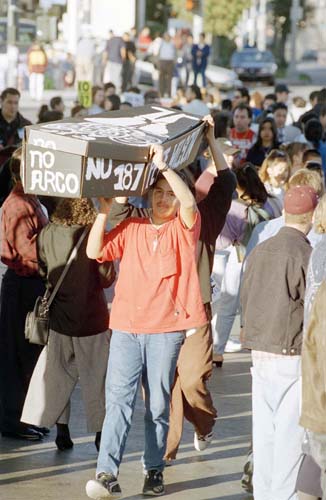
Protesters who oppose Proposition 187 carry out a mock funeral for the immigration initiative and Gov. Pete Wilson during a rally in Los Angeles, Nov. 3, 1994. (Chris Martinez/Associated Press)
Maritza Molio'o is at the swap meet pushing her granddaughter's stroller when she overhears us. She comes over to me and my microphone and starts in on how it wasn't right. She thought we were talking about what was happening today with the Trump administration's proposed public charge rule. The rule would prohibit immigrants from obtaining green cards if they use or might use public services. It's temporarily been blocked by a federal court.
Molio'o was a senior at Roosevelt High School in 1994. She still remembers the fear of the era. "My mom's was undocumented then and so she was afraid for a while until you know, she got her papers," Molio'o says. "But people are scared now."
Molio'o says that if something like Prop. 187 or the public charge rule were the law of the land when she was growing up, she might not be casually shopping at the swap meet with her 7-month-old granddaughter right now.
"If I wouldn't have the opportunity to go to school, then I wouldn't be able to own my home now, and my son wouldn't be a firefighter," she says. "I mean, my son has been able to save lives."
I turned the mic to her adorable granddaughter. She has nothing to say -- not yet at least.